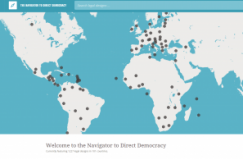The popular vote on 25 October will be taken alongside local elections. The coinciding of general elections and a national referendum will be a first time experience for the country. Not very positive insofar with regards to political debate as the election campaign seems to have stolen the spotlight from the referendum issue. The Bulgarian President has already voiced concerns about the political parties' low commitment with the e-vote debate. Thirty-one parties and eight citizens’ committees have been officially registered for the referendum information campaign.
Expatriates excited
Bulgarian expatriates are at most excited about e-voting. They will be eligible to vote in a plebiscite for the first time ever as a special amendment of the referendum law had been passed this summer for this purpose. Bulgaria is believed to have the most populous diaspora (mainly in Germany, USA, Greece, Spain, UK and Italy) proportionwise among the EU member states. Bulgarians residing abroad may well exceed 2 million against 7.2 million living in Bulgaria. Remote e-voting will obviously facilitate exercising voting rights by expats. Bringing them into the political process may impact the national political landscape, hopefully forwarding modernization and democratization of the country.
E-government in Bulgaria
Citizens’committees, also active in the campaign, have been pointing out a future boost of voter turnout as a major positive effect of e-voting, as well as cost-effectiveness and faster and more accurate tabulation of results. Opponents’ major argument is the insecurity of technology and the danger of coercion and vote-buying in remote, uncontrolled environments. The latter argument hits home with Bulgarian audiences frustrated at vote-trading which has been on the rise.
‘I don’t understand all the fear in e-voting, says Bozhidar Bozhanov, blogger and adviser to the national government, The mantra “if it’s a computer, it can break” is in fact “if it is anything in the real world, it can break”. But when has that stopped us from progressing …”
The prospect of electronic voting has been proposed and discussed for a number of years in Bulgaria, but not yet realized. In general, the country has been making a slow progess in e-government, ranking 27th out of 28 member countries of the EU (DESI* index 2015) and even slower progress in e-democracy. There are challenges to overcome, to be sure, but if Bulgaria votes in favor if distance e-voting it will establish a strategic dedication to adopting e-voting technology in the future.
High hurdles
To succeed, the referendum has to overcome a substantial hurdle – voter turnout should not be lower than the turnout at the last parliamentary elections - 3,500,585 voters have to go to the polling stations and half of them have to say “yes” to the referendum question.
Article by Daniela Bozhinova, board member of Democracy International.
More Information:
The Direct Democracy Navigator informs about the legal requirements of popular votes in Bulgaria.
*Digital Economy and Society Index developed by the European Commission


